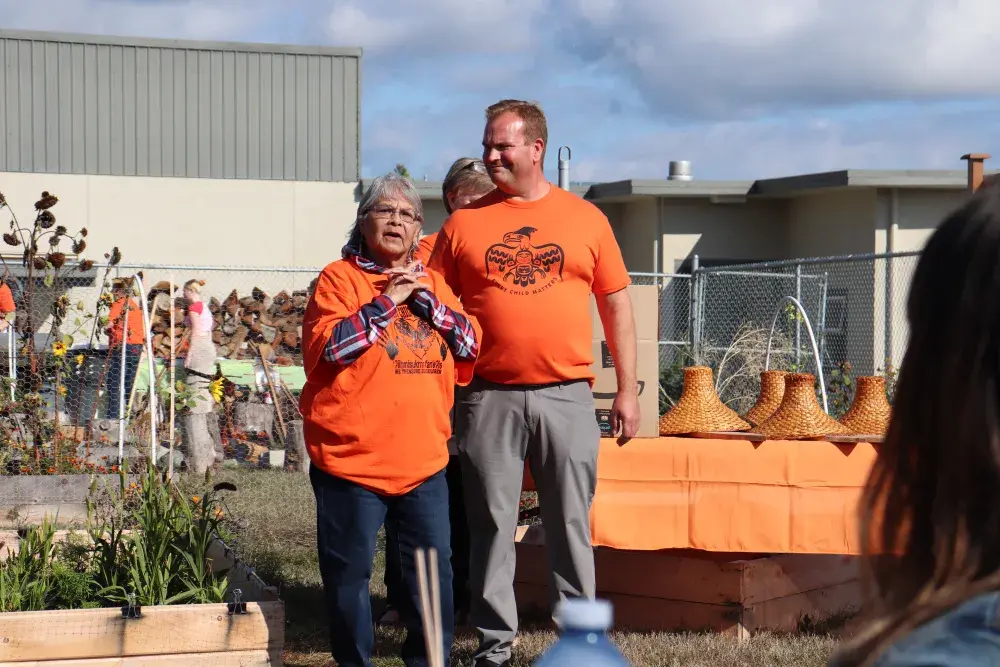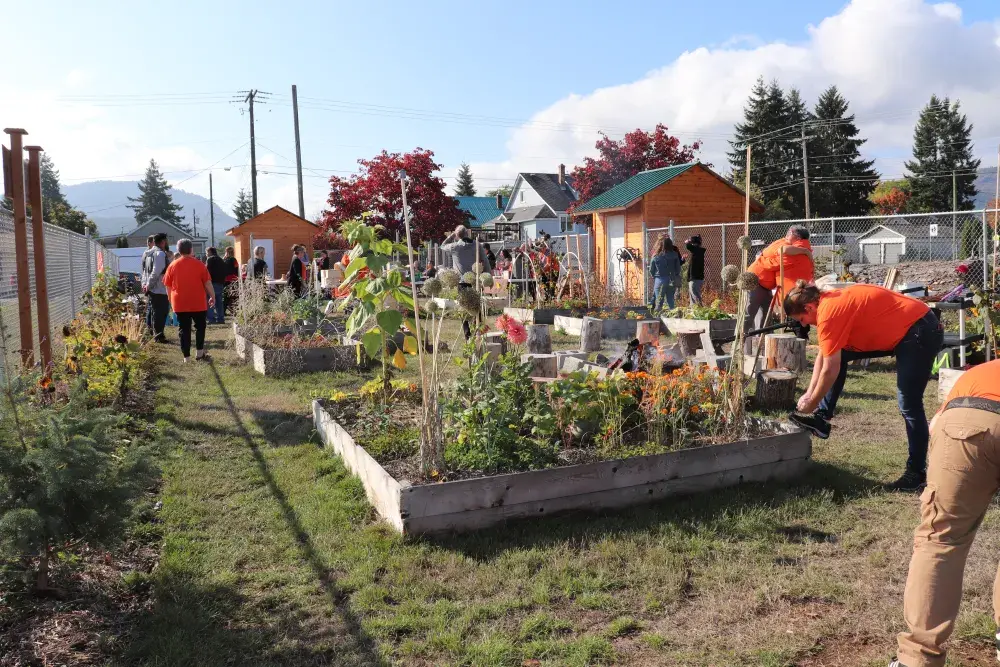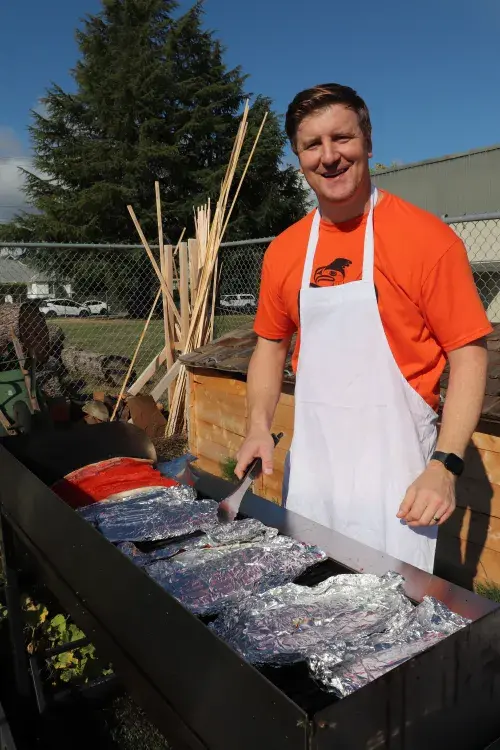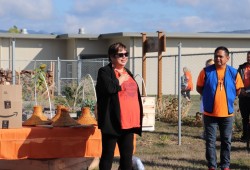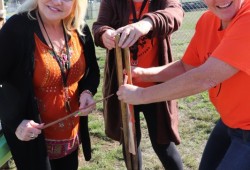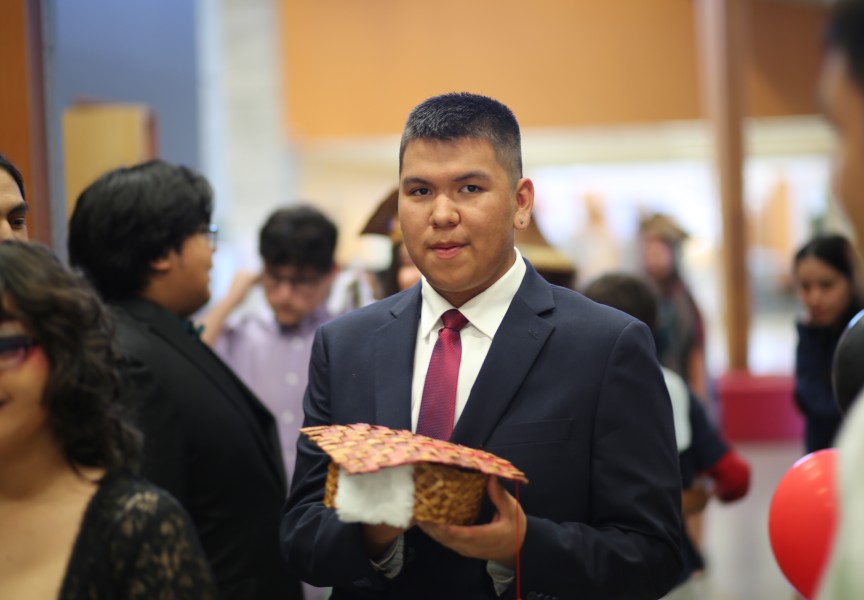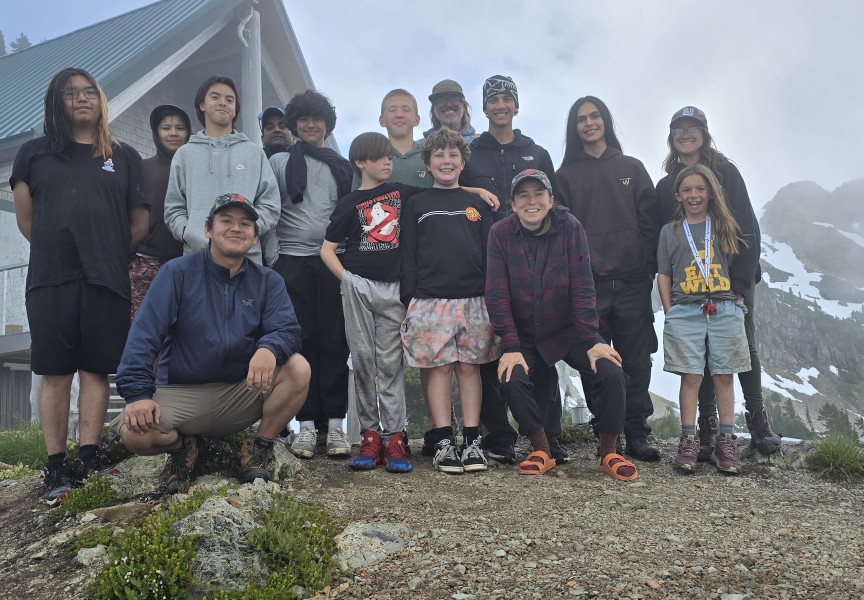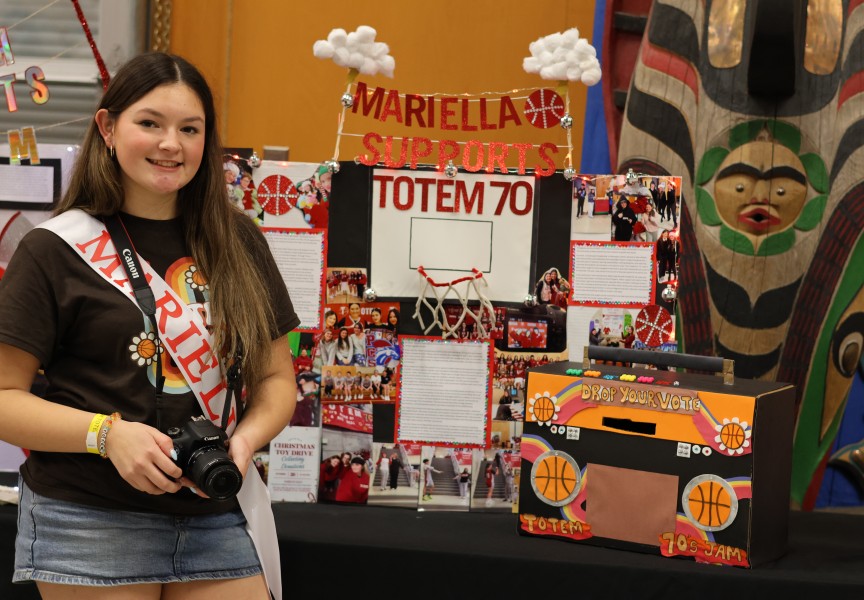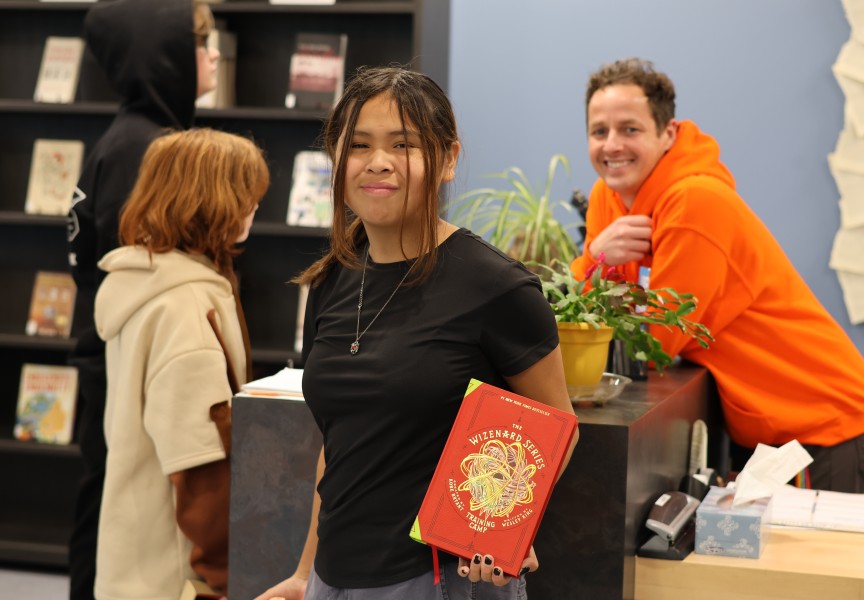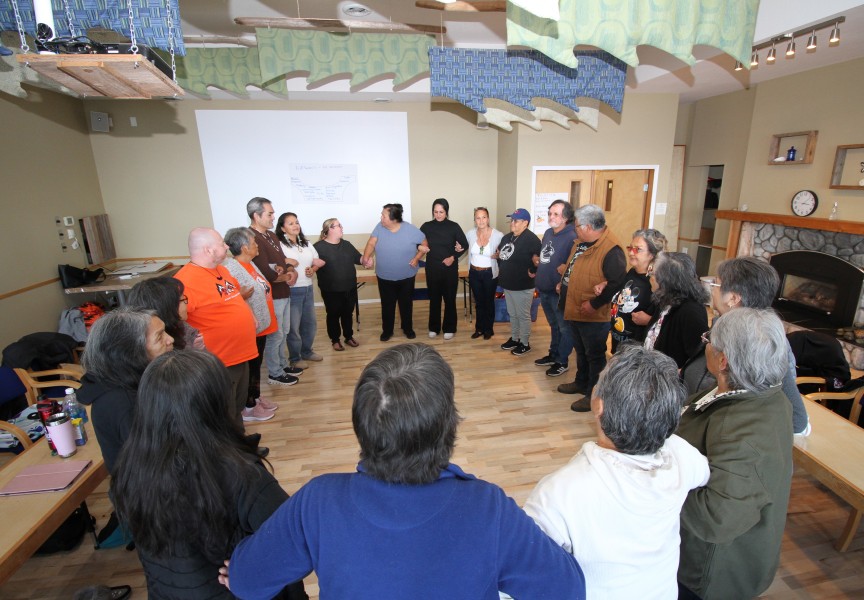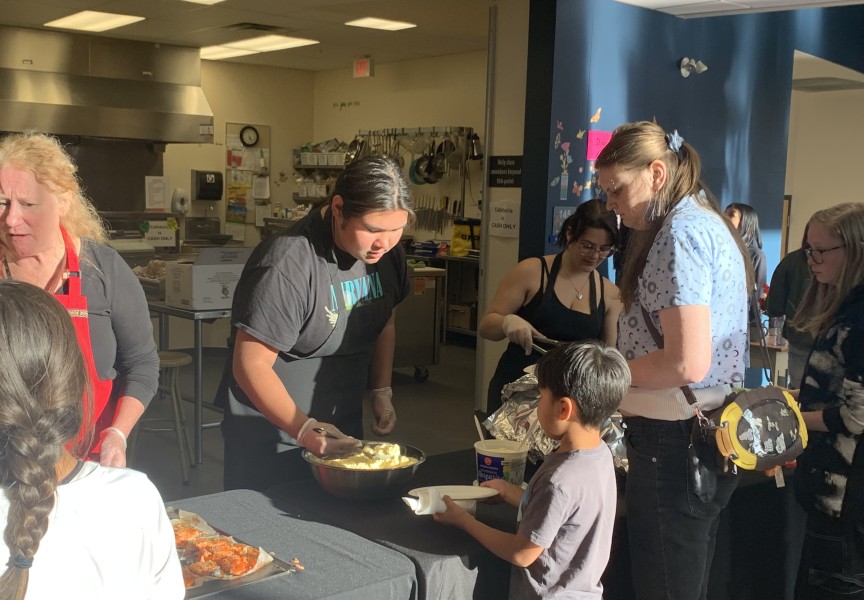A new, 10-week program has been launched at Eighth Avenue Learning Centre in Port Alberni that will give students hands-on learning opportunities that blend Nuu-chah-nulth culture with typical school lessons. The Chaputs Learning project brought together several partners, who each contributed to an exciting learning module that will see students learn about chaputs, or canoe.
Dave Maher, principal at Eighth Avenue Learning Centre, said the Chaputs Learning project will allow the school, students, and partners to move forward in a good way, by doing things differently. The Chaputs program’s intention is to center the learnings of our children and youth on Nuu-Chah-Nulth language and culture and to help students move forward through their high school curriculum with learning that is from a Nuu-Chah-Nulth lens.
Starting in 2021, the Chaputs program was co-developed by Usma and SD70. According to principal Maher, the program specifically creates Nuu-chah-nulth learning opportunities for children and youth that also meet school curriculum or course content.
“Participating children and youth will receive partial credit for foods, sciences, language arts, graphic arts, and active living for successfully participating in the Chaputs program. Students will learn Nuu-chah-nulth language, canoe culture, carving basics, and how to work effectively as a team, problem solve, how to be safe and comfortable in all types of weather, and how to work hard to reach a goal,” said Maher. The program will run under the guidance of Usma and SD70 staff and Nuu-chah-nulth elders and knowledge keepers.
According to Usma Director, Kelly Edgar, she began working SD70 and the NTC Education Manager, Ian Caplette a few years ago. They were looking for opportunities to expand their collaboration and, “create truly meaningful educational programming for not only our children in care, but all Nuu-chah-nulth children,” said Edgar.
Usma has been involved with the development of the community garden and barbecue area. They supported the construction of the Eighth Avenue Learning Center smokehouse and canoe carving space.
The celebration on Friday, September 29th was about the official launch of the Chaputs program and to honor the work that Usma and SD70 have been doing for the past two years to bring more learning opportunities to all students that are grounded in Nuu-Chah-Nulth teachings and culture.
“In addition, it was an opportunity to acknowledge all the partners that came together, specifically our elders and knowledge keepers and celebrate the collaboration and partnerships that have brought us to the creation of a program specifically intended to address identity, connection to history, connection to lands and resources,” said Edgar.
Ahead of Orange Shirt Day, or National Day for Truth and Reconciliation on September 30, SD70 has partnered with Usma Nuu-chah-nulth Family and Child Services and other organizations to explore ways in which Indigenous youth, including those in foster care, can feel a sense of identity and belonging in a school setting.
Maher said SD70, Usma, ADAPS (Alberni Drug and Alcohol Prevention Service), the RCMP, and IOCC (Inside Out Care Corporation) have been working together with school projects that incorporate Indigenous culture into the curriculum. The intent is to foster positive cultural experiences, mainly for children in care, but also for all students.
“Move forward together in a good way, hold them up,” said Maher.
Eighth Avenue Learning Centre (EALC), with help from the partners, has offered innovative programs that give all students hands-on teaching and practical skills, like the construction and development of a school garden where food is grown. Near the raised garden beds are a pair of smokehouses that the students helped build.
Now, the students will be offered teachings around the chaputs. According to Principal Maher, the importance of the chaputs (canoe) and its symbolism in Nuu-chah-nulth culture is the basis of the new program being offered at EALC. The idea was proposed by Nuu-chah-nulth elder Geraldine Tom.
EALC has been working in partnership with Usma, according to Maher, looking for opportunities to offer programming that helps both Indigenous and non-Indigenous youngsters feel good about themselves, to “lift them up”.
Maher said the Chaputs Learning Project got its start after Usma commissioned two Nuu-chah-nulth-style canoes a couple of years ago. The ensuing activities and events involving youth inspired Maher and Tom to explore the idea of teaching models that allow the children to learn about culture together.
Through teachings of the chaputs, students can explore Nuu-chah-nulth culture, language and traditions with activities like carving canoes and paddles, as well as actually navigating a canoe on the water.
Hesquiaht elder Tim Paul likes the idea, and told a crowd at EALC there is so much to learn when it comes to canoes. For example, there are many types of canoes used for specific purposes. And there are important teachings when it comes to the water, the waves. He encouraged the school district to take the class as far as possible.
“Teach our science of the canoe,” he said.
The class takes a hands-on approach and will be offered once a week over 10 weeks and is open to all students. They will paddle together and learn together from knowledge keepers.
Maher said the program will get students out from behind computer screens and into the rain or snow where they can get their hands dirty, pulling together.
“Students will paddle together, moving through the school curriculum in a program that reflects their culture,” he added.
On Sept. 29 a celebration for the launch of the Chaputs Learning Project was held at EALC with several invited guests.
NTC President Judith Sayers recalled stories from her grandparents and how they traveled the inlet and islands by canoe.
“They knew the tides, the moons and when they couldn’t travel the inlet,” she shared.
Sayers went on to say that she is proud of the work that Usma does on behalf of the youth, and she thanked them.
Geraldine Tom presented several gifts on behalf of Usma, acknowledging teams and individuals that helped make the program a reality.
“In this time of reconciliation, we’re building relationships together, combining two worlds,” she said.
SD70 Trustee Pam Craig said she was grateful.
“This is an important program that is hand-on, outside, and learning by doing,” she said.
Maher said it was a day to celebrate change with a program that promises positive cultural and personal identity. A positive Nuu-chah-nulth cultural identity as an everyday focus, he said.
Tim Paul noted that Nuu-chah-nulth ways of teaching are very different from the ‘Western way’.
“We are connected to nature – it is up to us to pass on and save what we have left – the teachings of our grandmothers,” he said.
“This is many years of work, moving community and SD70 forward to help all children feel safe and acknowledged,” said Maher.

